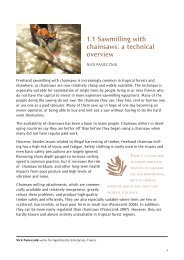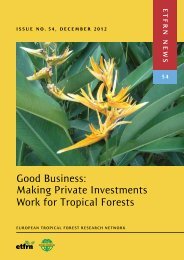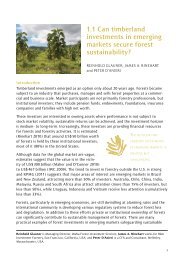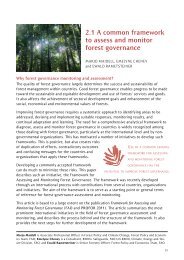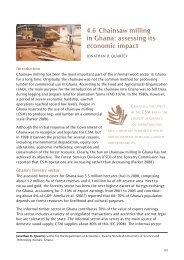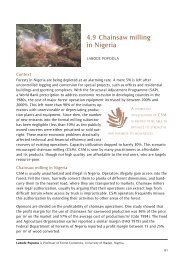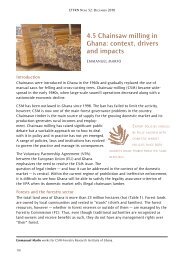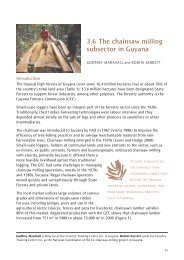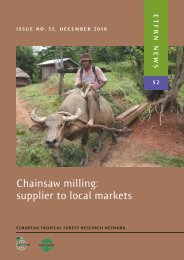Chainsaw milling: supplier to local markets - European Tropical ...
Chainsaw milling: supplier to local markets - European Tropical ...
Chainsaw milling: supplier to local markets - European Tropical ...
You also want an ePaper? Increase the reach of your titles
YUMPU automatically turns print PDFs into web optimized ePapers that Google loves.
190<br />
ETFRN NEws 52: DEcEmbER 2010<br />
easy shortcuts for contrac<strong>to</strong>rs or permit holders <strong>to</strong> substitute owner’s/traditional ruler’s<br />
royalties with licences/permits from the forestry department.<br />
in other rainforest states, e.g., Edo, diverse interest groups (largely made up of rentcap<strong>to</strong>rs)<br />
find their way through political appointments on<strong>to</strong> extra-departmental forest/log<br />
moni<strong>to</strong>ring committees and engage cronies <strong>to</strong> carry out the same statu<strong>to</strong>ry functions as<br />
government officials. unlike paid government officials, however, they handle offences detected<br />
in both the forest reserves and off-reserve areas with subversive intent and in tacit<br />
defiance of the law. interestingly, offenders are charged outrageous fines but only a paltry<br />
sum makes it <strong>to</strong> the government purse. Citing the dearth of trained staff in Edo state<br />
(where only 101 forest guards are deployed <strong>to</strong> protect forest reserves covering 6,000 km 2 ),<br />
the world bank (2005, 78) identified “weak and obsolete laws, poor work environment and<br />
lack of security for personnel as plausible disincentives” as requiring urgent attention.<br />
his<strong>to</strong>rical perspective<br />
Csm was scarcely practised before the 1960s, but it gradually succeeded pit-sawing and<br />
later gained prominence as quick conversion apparatus in southern nigeria. while the<br />
political exigency of the post-war 1970s and compelling socio-economic demands — which<br />
increased the demand for timber — could be responsible for the abolishment of the<br />
concessions, the instability they caused negatively affected the economic fortunes of most<br />
wood-based companies. many companies were compelled <strong>to</strong> fold up while the remaining<br />
few survivors scaled back their operations.<br />
against the backdrop of mounting governance costs, some state military governments<br />
(with large tracts of production forests) exploited their forests <strong>to</strong> shore up revenue, under<br />
the mistaken premise that timber was a renewable natural capital capable of generating<br />
steady returns. This phenomenon created free entry for a large number of small concessionaires,<br />
who explored cheaper and faster options of <strong>milling</strong>.<br />
Csm received widespread attention in areas where cus<strong>to</strong>mary tree tenure systems permit<br />
revenue from the timber resource <strong>to</strong> be shared by the government and the traditional<br />
ruler. This was particularly the case in off-reserve areas or community-managed forests<br />
governed by traditional institutions. The system involves the issuance of felling permits on<br />
a stumpage (per tree) basis by the state forestry department, which collects the revenue<br />
and pays royalties as a lump sum <strong>to</strong> the traditional ruler in the <strong>local</strong>ity. The system was<br />
fraught with abuses, however, and land owners who grew trees on farmlands had <strong>to</strong> obtain<br />
permits before cutting them down.<br />
chainsaw <strong>milling</strong> and livelihoods<br />
Csm provides ample opportunities for sustaining rural and family incomes. rural youth<br />
and women are mostly engaged in carrying lumber products <strong>to</strong> gantries or loading bays<br />
and timber sheds.



